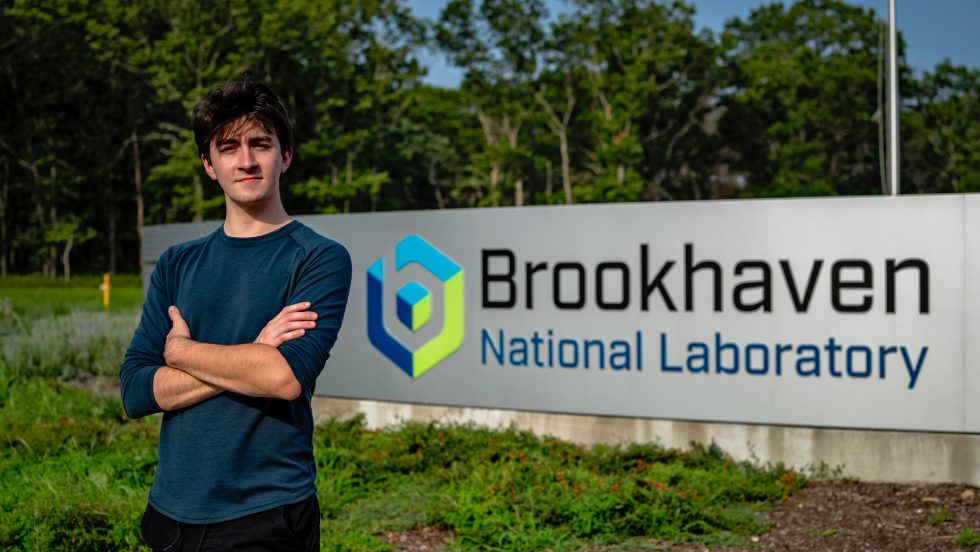
Summer internships at Adelphi continue to expand and offer our students extraordinary opportunities. This summer, junior Honors College student Edward Jansen earned a federally supported internship at Brookhaven National Laboratory working with emerging AI programming. Learn about his experience working near a nuclear reactor and a particle accelerator at one of Adelphi’s most prestigious STEM partners.
Edward Jansen, a physics major in Adelphi’s Honors College, never dreamed he’d be standing in front of a particle accelerator at the Brookhaven National Laboratory this summer. Thanks to the U.S. Department of Energy (DOE) Science Undergraduate Laboratory Internships (SULI) program, he found himself doing just that.
“These are things I grew up reading and learning about, and always considered to be distant ideas,” said Jansen, a junior studying quantum computational chemistry as well as physics. “Now all of a sudden, I’m in the middle of the woods next to the National Synchrotron Light Source II accelerator. You really start to understand the gravity of the environment that you’re in. I still feel like I haven’t fully grasped it.”
Jansen’s story illustrates Adelphi’s robust reputation in STEM education and dedication to offering high-quality internship programs. It also shines a light on Adelphi’s strong relationship with Long Island’s Brookhaven National Laboratory. In 2019, the two institutions collaborated to launch New York state’s first minor in scientific computing. Previous Adelphi students have also interned at Brookhaven to study subatomic particles and even write code for particle accelerators.
Conducting cutting-edge machine learning and AI research
For the 10-week summer internship, SULI participants conduct cutting-edge research related to the DOE’s mission: addressing energy and environmental challenges through science and technology.
Jansen will focus on programming neural networks, the technology behind AI chatbots like ChatGPT. And he’ll apply those networks to condensed matter materials science—or the study of atoms that make up natural and synthetic materials.
“This is a huge privilege to be here,” said Jansen, one of the few students working on machine learning and AI at the lab. “It’s such an interesting place to be in, especially with the dawn of artificial intelligence that we’re about to enter into.”
Jansen is also excited to be working with the supercomputers available at the lab. “A lot of my training is done on a specific government network, so I have access to what’s called a SuperCluster,” he said. “While a standard PC has about eight processors, this computer has over 200. That’s how we’re able to run such computationally heavy calculations.”
At the end of the internship, he’ll have an opportunity to share his findings through a poster and paper. Select students will be chosen to give presentations.
“If you’re planning to enter a PhD program, having that completed academic paper is a big deal, so that’s very exciting,” he said. “I also hope that I’m one of the students selected to present, because I love to talk about my work.”
Running quantum mechanical calculations at Adelphi
Jansen developed the idea for his project after studying density functional theory (DFT) at Adelphi with associate professor of chemistry Ivan Hyatt, PhD. DFT is a computational method used to calculate the structure of atoms and molecules.
“I’ve been working on Dr. Hyatt’s research team since my freshman year, and it’s been one of the most important, most interesting experiences I’ve had at Adelphi,” Jansen said. “To go from someone who barely understood basic high school physics concepts to now working with him on quantum chemistry has been amazing.”
At Adelphi, Jansen uses his knowledge of physics and programming to help run calculations for the chemistry research team. Now at Brookhaven, he can train models to run these calculations for days using machine learning. This should help the computers discover new patterns and more quickly pull information about each molecule.
After his internship, he looks forward to bringing his findings back to Adelphi.
“I can bring a new perspective to this research and I really do hope to enhance our processes, maybe even with the help of artificial intelligence, before I graduate,” Jansen said. “Maybe I’ll leave behind something from my experience at Adelphi—create a program that researchers can use in the future. I’d like to do that.”